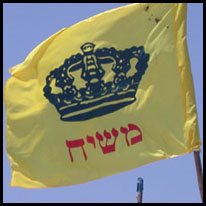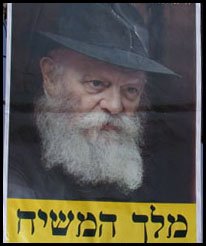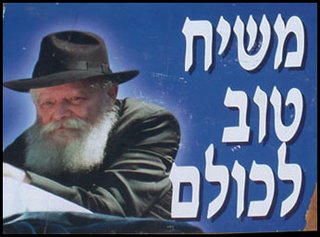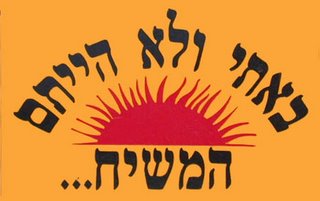Since Sunday, April 16, was Easter Sunday, you might not think my title is strange. Perhaps where you are, everybody is talking about the resurrection. However, here in Israel, even on Easter Sunday, everybody isn’t usually talking about the resurrection, unless, of course, you were one of 10,000 people packed into Tel Aviv’s Nokia Arena on Sunday night.
One of the organizers, Yoni Kahana, happily described the evening as “an amazing turnout.” He went on to say that that “Everyone came away with renewed faith in the imminent coming of [the messiah]. He may not have come on Sunday night. But he will truly be revealed any second.” Wow, ten thousand people gathered together in Tel Aviv, Israel excitedly anticipating the return of the messiah. Now that is something that will even get a Baptist to shout “amen,” maybe even clap.
The interesting twist on this, however, is that on this Easter Sunday they weren’t talking about Jesus’ resurrection and imminent return, they were talking about the (hoped for) resurrection of the late Rabbi "Messiah" Menahem Mendel Schneerson, who died in Brooklyn in June 1994.
This kind of resurrection talk isn’t new; it's just different in that it is open and public. In the years since Schneerson’s death, particularly in the days immediately following, many of his followers proclaimed their belief in

his identity as Messiah, but it was almost an “in house” discussion. A discussion that, at times, grew to more than a friendly discussion, which threatened to completely split the Chabad movement.
In recent years, though, I have noticed a growing number of posters along the highways proclaiming The Rebbe, as his followers know him, as Messiah. Some are more subtle than others, like the one on the right, for example: On this flag, the word Messiah (in Hebrew) is written under the royal crown. If you don’t have more background information on this campaign, it would be easy to dismiss this as a fervent, religious Jew simply flying his colors.
This poster (below), commonly seen all over Israel,

fits into the less subtle category as it says “King Messiah” under the photo of The Rebbe. I’m not certain that this particular poster was at the convention hall on Sunday night, but the sentiment certainly was. Rabbi Zalman Notik of the Torat Emet Yeshiva in Jerusalem spoke openly of Rabbi Schneerson as the messiah. Furthermore, he supported the missionary zeal for which Chabad has become known when he said, “…the most important mitzvah [commandment] is to publicize the idea that the Rebbe is messiah.” No wonder Chabad is often characterized as the Jewish evangelicals: They believe that Rabbi Schneerson is the messiah and that he is good for everyone, particularly Jews.
A religiously observant, Jewish friend once told me that he didn't agree with Chabad's or my desire to tell others about our faith. "I believe" he said "that what I believe is good for me, but not necessarily for everyone else." I pointed out that that is one major difference between us: I believe that Messiah is not only good for everyone, but necessary. Apparently followers of the Chabad sect of Judaism believe more like I do about messiah in that regard. Our disagreement comes in the identity and function of the messiah,

not the desire for others to know about him.
This poster (right) includes with The Rebbe's photo the words, "Messiah is good for everybody."
Rabbi Schneerson Quick Facts:
Date of Birth: April18, 1902
Place of Birth: Nikolaiev, Ukraine
Visits to Israel: None
Date of Death: June 12, 1994
Place of Death: New York, USA


 his identity as Messiah, but it was almost an “in house” discussion. A discussion that, at times, grew to more than a friendly discussion, which threatened to completely split the Chabad movement.
his identity as Messiah, but it was almost an “in house” discussion. A discussion that, at times, grew to more than a friendly discussion, which threatened to completely split the Chabad movement. fits into the less subtle category as it says “King Messiah” under the photo of The Rebbe. I’m not certain that this particular poster was at the convention hall on Sunday night, but the sentiment certainly was. Rabbi Zalman Notik of the Torat Emet Yeshiva in Jerusalem spoke openly of Rabbi Schneerson as the messiah. Furthermore, he supported the missionary zeal for which Chabad has become known when he said, “…the most important mitzvah [commandment] is to publicize the idea that the Rebbe is messiah.” No wonder Chabad is often characterized as the Jewish evangelicals: They believe that Rabbi Schneerson is the messiah and that he is good for everyone, particularly Jews.
fits into the less subtle category as it says “King Messiah” under the photo of The Rebbe. I’m not certain that this particular poster was at the convention hall on Sunday night, but the sentiment certainly was. Rabbi Zalman Notik of the Torat Emet Yeshiva in Jerusalem spoke openly of Rabbi Schneerson as the messiah. Furthermore, he supported the missionary zeal for which Chabad has become known when he said, “…the most important mitzvah [commandment] is to publicize the idea that the Rebbe is messiah.” No wonder Chabad is often characterized as the Jewish evangelicals: They believe that Rabbi Schneerson is the messiah and that he is good for everyone, particularly Jews.  not the desire for others to know about him.
not the desire for others to know about him.